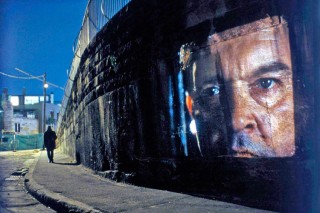Title

A highlight of Beyond the Machine 13.1, which takes place March 27-30, will be a screening of Australian filmmaker Michael Bates’s short The Projectionist (pictured) with new music by four Juilliard composers.
More Photos »The future of classic art forms, like the future of film, seems bound up with the digital revolution, and increasingly, musicians, dancers, and actors will find their livings in highly technical environments. This spring’s Beyond the Machine 13.1 is a harbinger of these trends, says faculty member Edward Bilous (M.M. ’80, D.M.A. ’94, composition), who’s the director of Juilliard’s Center for Innovation in the Arts (formerly called the Music Technology Center), which sponsors the biannual festival. Beyond the Machine opens on March 27 and runs for four days; students and alumni from all three divisions will take part.
Body
One highlight of this year’s festival is the award-winning short film The Projectionist (2003), which will be accompanied by new music by four Juilliard composers. The 14-minute “humanimation,” as the filmmaker, Michael Bates, calls it, follows an aging projectionist as he leaves his post for the last time. “Short films are very valid in their own right, not merely a calling card for feature films; they’re more akin to poetry,” Bates told The Journal. “I wanted to create something both poetic and epic. Part of its success is that it doesn’t have dialogue and doesn’t need to be translated.”
While The Projectionist originally used Rachmaninoff’s The Isle of the Dead (Op. 29) as its soundtrack, here it will be shown with new scores by Kristoffer Ricat (Pre-College ’96; ’02, guitar), Evening Division faculty member and music technology teaching assistant Taylor Hollyer (B.M. ’08, M.M. ’11, double bass), and composition students Sayo Kosugi and Chad Cannon.
Hollyer, a self-described “tech-savvy musician rather than a music-savvy technician,” told The Journal about his composition for The Projectionist. “I’m showing [the central character’s] loneliness and the burden he holds; I want to showcase some of his sadness, and play to the fact that the director shot it in layers, real time, stop motion—three different rates of speed going at the same time,” he said.
Ricat studied classical guitar with Sharon Isbin at Juilliard, but also toured with a rock band, the Velocet, and was a teaching assistant in the music technology program. After Juilliard he scored TV and film documentaries and worked on independent films with some artist friends before deciding to make his career in the studio. His contribution to Bates’s film is “all sound design,” Ricat told The Journal. “It feels very existential, a man moving through night, his last day ever at this job: I’m walking a line between a heart-wrenching, old-world romantic style, and keeping it more mysterious, ambiguous. The harmonies are a little more dreamlike, dissonant. I’m using multiple guitars, overdubbing myself, and strings, woodwinds, and piano. My gut reaction when I first screened it was that it felt like Samuel Beckett, a lone figure moving as memories from the past come in and dissipate.”
Composition student Sayo Kosugi, who is currently on leave from Juilliard, composed for commercial films in her native Japan before coming to Juilliard, where she took Bilous’s film-scoring class. “Since the images in the film are quite abstract, I want to try an approach where the music will give the film a voice—a storytelling element,” she told The Journal. “A solo violin could give direction to the feelings I want the audience to sense. I would like to let them listen and be led into the emotion of the film.”
Also on the bill at Beyond the Machine is Versions, a 2010 film by Oliver Laric that is presented in collaboration with the Museum of Arts and Design and explores the relationship between reality and reproduction. Here, the narrator will be Drama student Amanda Pedlow and the violinist will be third-year Chelsea Starbuck Smith.
Continuing the cinematic theme, fourth-year dancer Jenna Pollack will perform her new choreography Preferred Project(ion). “I thought about how to make a piece using the technology, but not making it about the technology,” Pollack told The Journal. “I decided to look at the body through different lenses.” Her dance tracks the body as a “process image,” using recorded speech by filmmaker Errol Morris and audio from the Westminster Kennel Club dog show in which judges decide which dog’s body is better. Another inspiration was arts-education expert Ken Robinson’s 2006 TED talk about how dance is always on the bottom of the academic hierarchy. In it he said that “professors view their body as a form of transport for their heads, a way to get their heads to meetings,” and Pollack is using two minutes of Robinson’s talk as part of the background of the piece. “We put down a light trough, so light projects upward and highlights my face: a bodiless head, isolating different body parts as a way of showing that we chop up our bodies. The camera’s facing upstage; I’m facing downstage; the audience sees what’s happening on the screen,” she said. “A dance doesn’t always have to face front.” As is the case throughout Beyond the Machine, rules are made to be broken.







